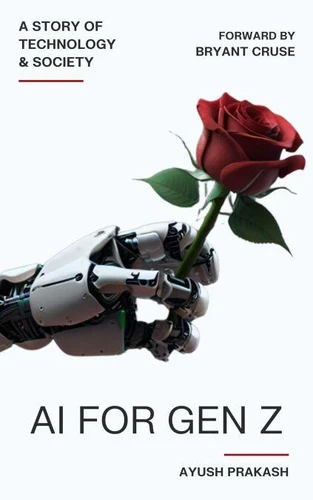AI for Gen Z: A Story of Technology and Society
Par :Formats :
Disponible dans votre compte client Decitre ou Furet du Nord dès validation de votre commande. Le format ePub est :
- Compatible avec une lecture sur My Vivlio (smartphone, tablette, ordinateur)
- Compatible avec une lecture sur liseuses Vivlio
- Pour les liseuses autres que Vivlio, vous devez utiliser le logiciel Adobe Digital Edition. Non compatible avec la lecture sur les liseuses Kindle, Remarkable et Sony
 , qui est-ce ?
, qui est-ce ?Notre partenaire de plateforme de lecture numérique où vous retrouverez l'ensemble de vos ebooks gratuitement
Pour en savoir plus sur nos ebooks, consultez notre aide en ligne ici
- FormatePub
- ISBN978-0-9811821-2-4
- EAN9780981182124
- Date de parution12/12/2024
- Protection num.pas de protection
- Infos supplémentairesepub
- ÉditeurAyush Prakash
Résumé
AI for Gen Z: A Story of Technology and Society is a groundbreaking book by a member of Gen Z, for all members of Gen Z. Talking about the perils of AI technologies is not enough. Gen Z interact and think in fundamentally different ways compared to previous generations. This means that their entrance into broader society is predicated on years of digital bubbles and echo chambers. This book aims to close the gap between generations.
It is imperative that all generations (including Gen Z themselves) seek to understand the precarious state of the digital natives; how tech has/is/will affect them, what present and future circumstances are reshaping their careers, lifestyles, and minds, and how to orient them towards a better future.
It is imperative that all generations (including Gen Z themselves) seek to understand the precarious state of the digital natives; how tech has/is/will affect them, what present and future circumstances are reshaping their careers, lifestyles, and minds, and how to orient them towards a better future.
AI for Gen Z: A Story of Technology and Society is a groundbreaking book by a member of Gen Z, for all members of Gen Z. Talking about the perils of AI technologies is not enough. Gen Z interact and think in fundamentally different ways compared to previous generations. This means that their entrance into broader society is predicated on years of digital bubbles and echo chambers. This book aims to close the gap between generations.
It is imperative that all generations (including Gen Z themselves) seek to understand the precarious state of the digital natives; how tech has/is/will affect them, what present and future circumstances are reshaping their careers, lifestyles, and minds, and how to orient them towards a better future.
It is imperative that all generations (including Gen Z themselves) seek to understand the precarious state of the digital natives; how tech has/is/will affect them, what present and future circumstances are reshaping their careers, lifestyles, and minds, and how to orient them towards a better future.



